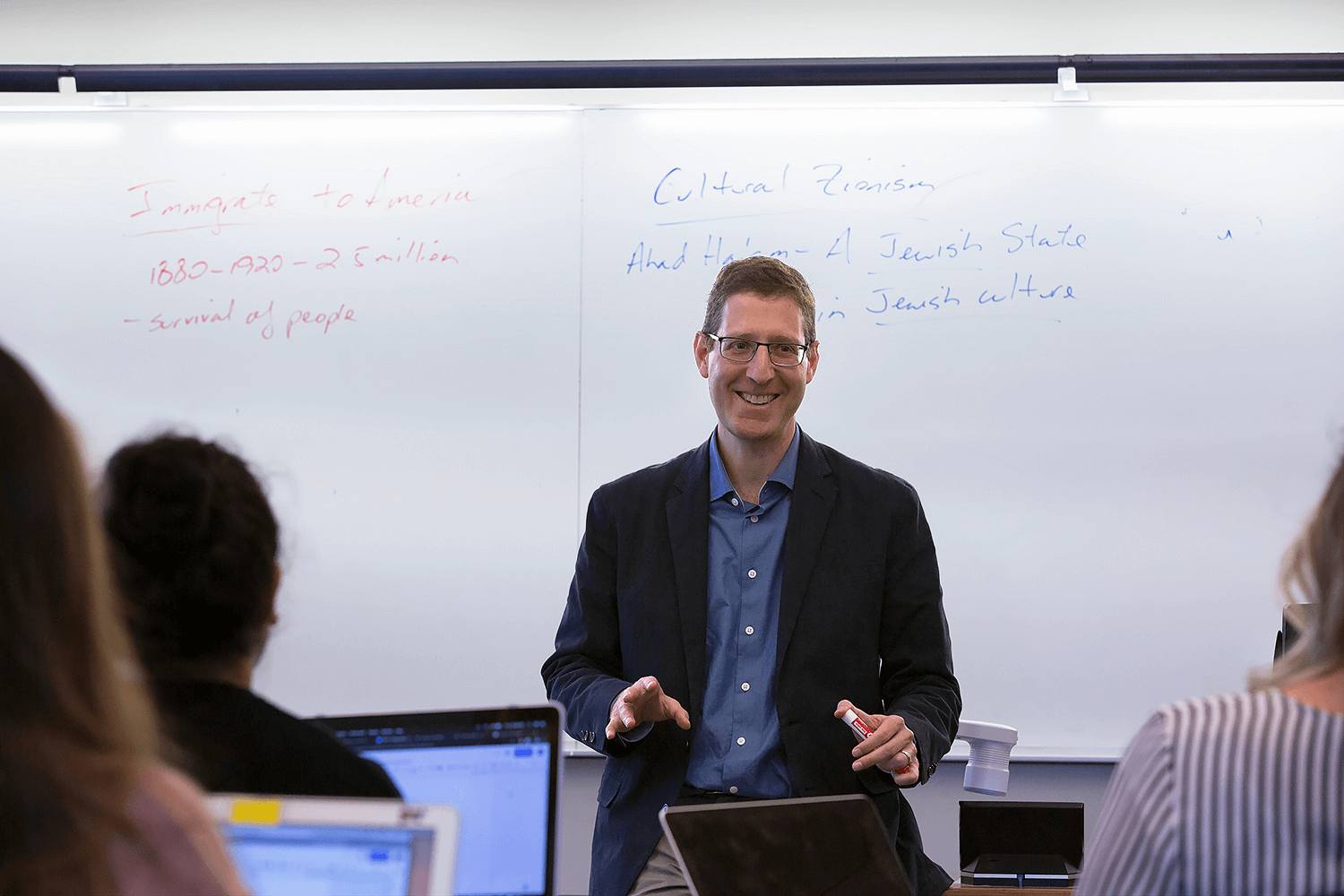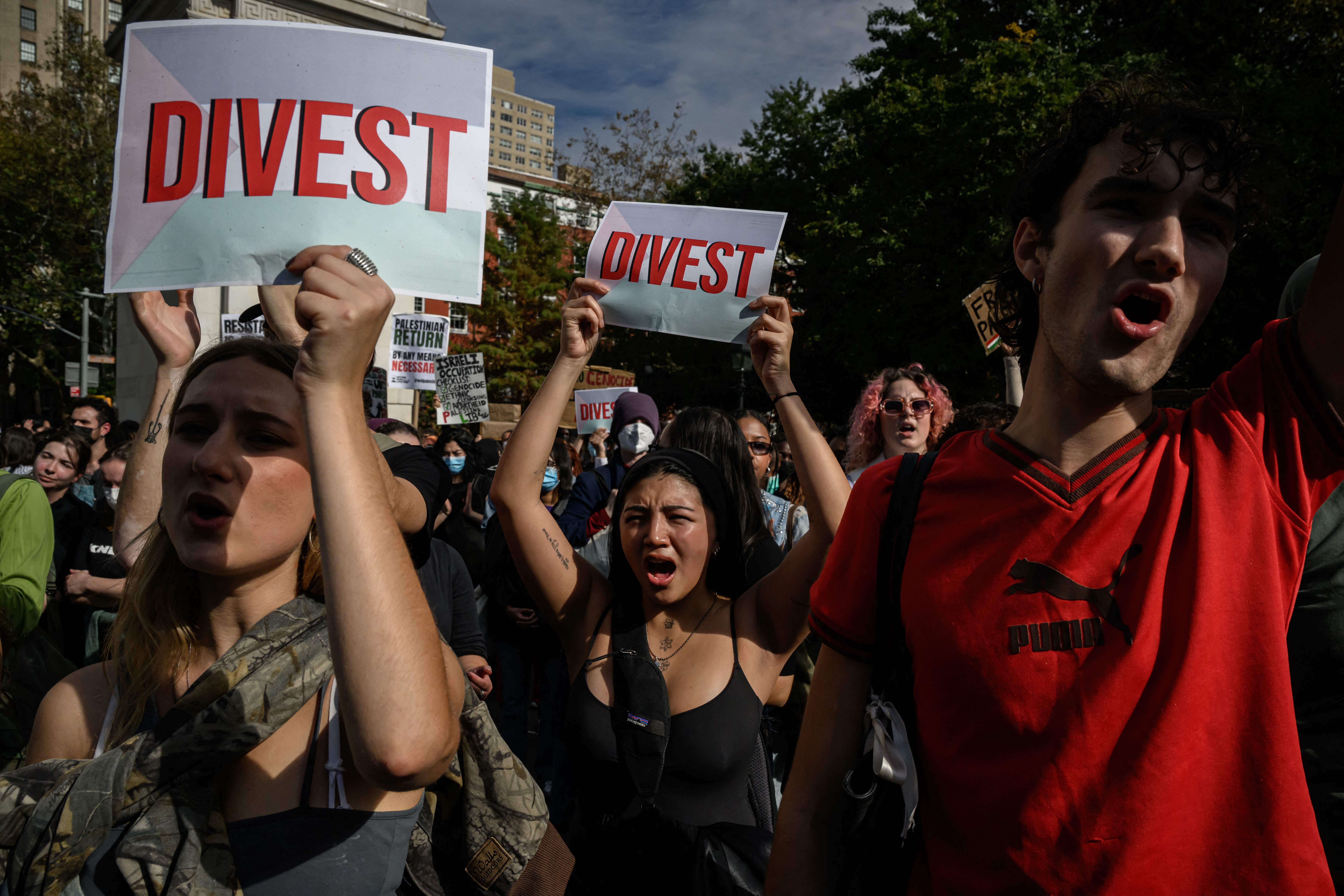Director of NYU’s new antisemitism research center doesn’t want to be ‘hamstrung’ by Israel politics
Avinoam Patt, who was named as the center’s inaugural director Monday, hopes to insulate scholars from the political climate

Avinoam Patt, seen here teaching at the University of Connecticut, was named inaugural director of NYU’s new antisemitism research center Monday. Patt will help build the center during a contentious period of debate around antisemitism and Israel on college campuses. Photo by Bri Diaz/UConn Photo
When New York University announced its intentions to create a new center to study antisemitism in November, several critics pointed out that the move came just weeks after three Jewish students sued the school over what they alleged was antisemitic discrimination by the university.
But NYU President Linda G. Mills said in a statement that the gift “comes at the right time,” a moment that “cries out for new study, new insights, and new solutions to combating this age-old hatred.”
Two anonymous donors have provided seven figures of initial funding, including a new $1 million gift, for the NYU Center for the Study of Antisemitism, which is slated to open in the fall.
Avinoam Patt will be the center’s inaugural director and said he has big plans for the first academic center researching antisemitism in what he described as the “largest Jewish city in the world.”
“This is really an attempt to create a major research institute,” said Patt, a Holocaust scholar who left the University of Connecticut and began teaching at NYU Monday.
Avoiding tensions over Israel
Patt said he is excited to oversee research into the efficacy of Holocaust education, online antisemitism and “Israel as a focal point for Jewish hate and how it manifests around the world.”
At the same time, he said he understands the tension now swirling around antisemitism, Israel and university campuses — including at NYU. “I’m very, very aware of the political complexities that come with a position like this,” he said.
The presidents of Harvard and the University of Pennsylvania were both forced to resign in recent weeks amid criticism over their handling of antisemitism and protests against Israel at their schools, with a handful Jewish donors leading the calls for them to step down.

In November, three Jewish students sued NYU claiming that the school had failed to properly apply anti-discrimination policies to antisemitism and tolerated chants like “gas the Jews” and “Hitler was right.” The school, which previously settled a federal investigation into antisemitism, has denied the claims.
At the same time, pro-Palestinian activists have accused NYU of discriminating against them by “harmfully conflating” anti-Zionism and antisemitism.
When it announced the center, NYU said that it would research both “classical forms of antisemitism as well as the ‘new antisemitism’ and its links to anti-Zionism.”
Patt said he wants to avoid aligning the center with a single understanding of antisemitism.
“I’m not so naive to believe we can transcend the politics of it,” he said. “But if we’re hamstrung by being defined as taking one political position or another political position we’re going to be handicapped from the beginning.”
A focus on Holocaust survivors
Patt, who grew up in Houston with Israeli parents, began studying antisemitism as an undergraduate at Emory University, where he was advised by Deborah Lipstadt, the renowned Holocaust scholar who is now the State Department’s special envoy for combating antisemitism.
As a graduate student at NYU, he became fascinated by the experience of Jewish Holocaust survivors living in refugee camps after World War II, a topic that became the subject of his first book.
He went on to teach at the University of Hartford, where he ran a Jewish museum on campus, and at NYU before moving to the University of Connecticut, where he created a special “pop-up course” on contemporary antisemitism two years ago.
Patt, 48, has written a number of opinion articles in recent years, including several condemning Republicans for comparing COVID-19 restrictions to the Holocaust, and another highlighting antisemitism during the Jan. 6, 2021, riot at the Capitol.
He also expressed support on social media for Liora Halperin, a professor at the University of Washington whose endowed chair was eliminated at the request of a donor who was upset over her criticism of Israel.
Patt said he doesn’t know who the anonymous benefactors behind the antisemitism research center are and hopes “to build a center that is going to be insulated as much as possible from some of the external political pressures so we can study this problem with academic integrity.”
Since Oct. 7, he has condemned claims that Israel is committing a genocide in Gaza, and defended comparisons between Hamas and the Nazis. “Just as the Nazis aimed to annihilate the Jews, Hamas and affiliated terrorist organizations share the same objective: the destruction of Jews,” Patt wrote, alongside an Israeli professor.
In a phone interview, Patt said that he believed much, but not all, expressions of anti-Zionism were antisemitic. “I don’t think it’s true in every single case, so I can’t make a blanket statement,” he said.
He hopes that the new center may be able to explore the way that politics related to Israel have shaped our understanding of antisemitism. Patt is also interested in studying the ways that Jews have fought back against antisemitism.
“It’s really important to make sure that we don’t just study the perpetrators,” Patt said.
















